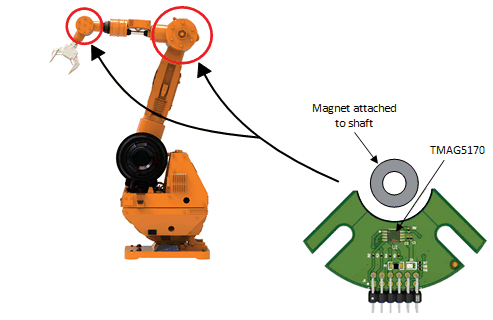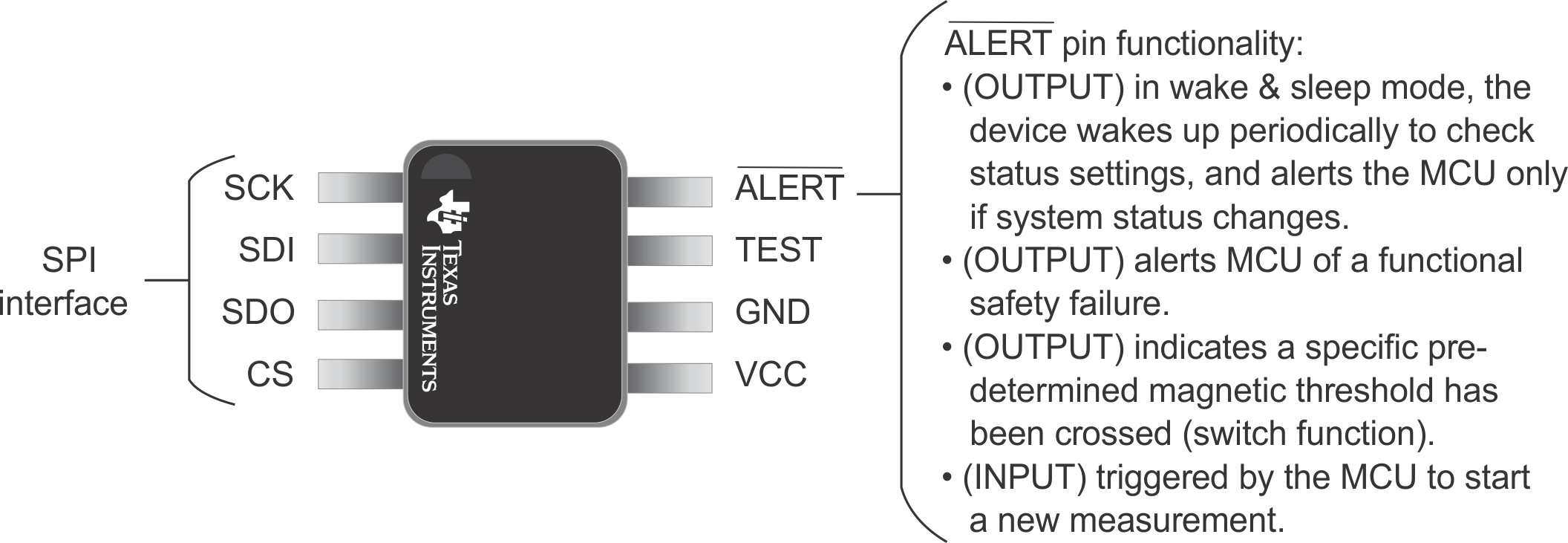SBAA530 September 2021 TMAG5170 , TMAG5170-Q1 , TMAG5173-Q1
4 Gaining Higher Reliability
Factory automation has always needed highly-reliable products. With the advent of Industry 4.0, a reliable diagnostic scheme is vital to achieve zero downtime, or at least minimize downtime as much as possible. In the majority of robotic systems, a multiaxis sensor or rotary encoder determines the angle of each joint in a robotic arm (as shown in Figure 4-1), or each wheel in an autonomous mobile robot, ensuring precise movement and navigation throughout the assembly line and factory floor. Unlike optical encoding solutions that are susceptible to dirt or moisture, the performance of magnetic encoders is unaffected in harsh environments.

Figure 4-1 Example of a Robotic Arm Using the TMAG5170
A sensor that includes built-in safety measures and enables users to diagnose potential problems that may arise during operation is a requirement for factory automation systems. Table 4-1 summarizes the device- and system-level diagnostics features provided by the TMAG5170.
| Device-Level diagnostics | ||
|---|---|---|
| Diagnostics | Function | Benefit |
| Reliable communication check | Cyclic redundancy check (CRC) communication:
|
Provides a communication solution that does not need interface filtering to reduce noise injection and data corruption |
| Internal memory and register checks |
|
Checks sensor signal path to ensure a known good measurement |
| Signal-path diagnostics | Checks for signal path integrity | |
| Per-axis Hall-sensor diagnostics |
|
|
| System-Level diagnostics | ||
| Diagnostics | Function | Benefit |
| Pin continuity | Checks for shorts between various pins such as VCC, GND, and Serial Peripheral Interface (SPI) bus pins | Adds system-level, long-term reliability by detecting potential hazards that could cause catastrophic failures |
| Magnetic field out of range | Sets threshold value during configuration and compares to the magnetic field | Enables redundant field amplitude checks with no additional Hall switches |
| Ambient temperature out of range | On-chip temperature sensor monitors die temperature and compares to a user-defined threshold | Alerts the system of a thermal failure event without the additional cost of an external temperature sensor |
| Power-supply undervoltage, overvoltage and internal low dropout undervoltage | Alerts the MCU of out-of-range power-supply voltages | Eliminates the need for an external power-management supervisory device |
SPI provides reliable communication with the TMAG5170, which includes an alert input/output pin for added functionality, as summarized in Figure 4-2.

Figure 4-2 TMAG5170 Digital Interface